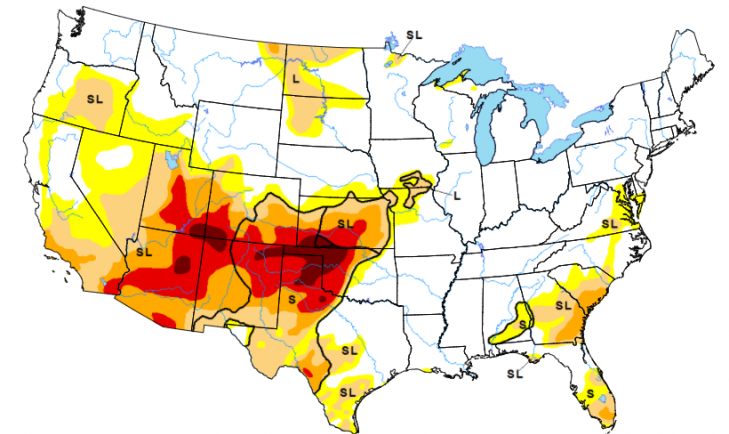
The Western Governors' Association keeps you updated on news of the West. Here are the western stories for the week starting April 16, 2018, that you don't want to miss. Image: United States Drought Monitor
Brutally hot and dry conditions in the Southwest have contributed to drought and wildfires in Oklahoma, Kansas, Colorado, New Mexico and Texas.
“If you don’t have water, you don’t have anything” said Oklahoma cattle rancher Monte Chain. “You can have all the grass in the world, but you can’t haul enough water to a cow.” Watch the interview to learn how farmers and ranchers are handling the early season dry conditions.
The U.S. Drought Monitor, which produces a weekly report of conditions nationwide, reports that “exceptional drought,” the most severe on its rating scale, has expanded in the Four Corners Region.
Across the country, nearly one third of the continental U.S. was in drought in early April. In California, officials are considering permanent bans on wasteful water practices and Utah water managers are encouraging conservation to compensate for low river flows.
Effects of the drought are especially evident in Oklahoma, where windy and dry conditions have contributed to wildfires this week that have claimed two lives and scorched hundreds of thousands of acres. Winds are easing, but the wildfires continue to burn and are at risk of spreading to nearby New Mexico, Texas and Kansas.
Image: Lace Andersen, Hawaii News Now 
The Great Outdoor$: The Outdoor Industry Association’s report on the economic impact of outdoor recreation in the country’s 435 congressional districts shows Utahns spend $7 billion annually, while the state’s outdoor recreation economy generates $12.3 billion in annual consumer spending. In Colorado, each of the state’s seven congressional districts generated $2 billion in spending or more in 2017. See how much spending there was in your district.
Parks Prices not Spiking: The National Park Service has modified their proposed plan to more than double entrance fees in some of the nation’s most popular national parks. A more “modest” increase to address significant deferred maintenance issues will be implemented in June. Read last week’s edition of Best of the West to learn more about how the parks have dealt with maintenance in the past.
Get the latest news about the West and its governors by following the Western Governors' Association on Twitter, Facebook and LinkedIn.